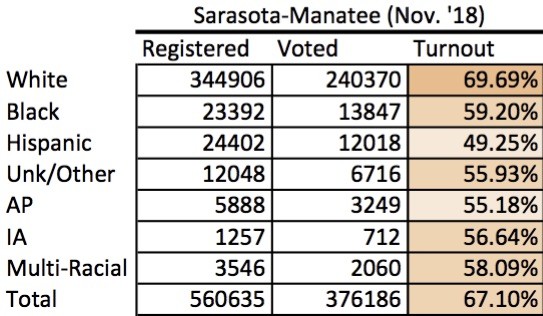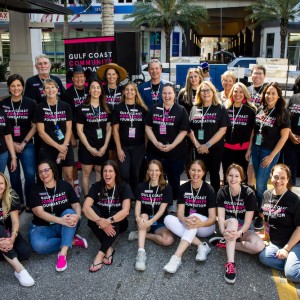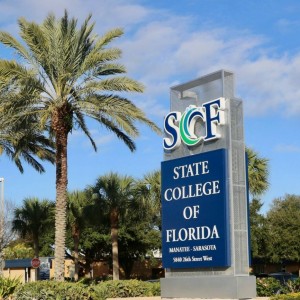A Return to Democracy
Under The Hood
SRQ DAILY
SATURDAY JAN 12, 2019 |
BY JACOB OGLES
Voter turnout after any given election reveals many citizens take the chance to participate in democracy for granted. But the automatic restoration of rights to more than a million ex-felons in Florida this week shows how badly people missed this ability once it was gone.
“Returning citizens could be the biggest voting bloc in Florida,” said Michael Barfield, Board President of the ACLU of Florida.
A new amendment to Florida’s constitution kicked in Tuesday, opening polling station doors anew to those who already paid a price to society. Elections officials report 100 self-identified ex-felons in Manatee County and another 78 in Sarasota registered to vote the first three days of this new era of eligibility.
That’s likely not even the full picture. Voters registering locally for the first time do not have to disclose their past criminal status, according to Amy Lynn Potter, an administrative specialist in Sarasota’s office. It’s likely many of the 151 other registrations in Sarasota on Tuesday, Wednesday and Thursday fell into the category of “returning citizens.”
As debate over voting rights restoration played last year, it became clear the lifetime ban on ex-felons voting encompassed a far broader group than many might presume. Of course, a disproportionate number of people in Florida’s minority population suffered this unjust punishment. A flip through Department of Corrections inmate photos reveals the disproportionate impact felony convictions can have.
Barfield said the link to the Jim Crow era, documented in the minutes of the Florida Legislature, showed racist intent always existed with voting restriction.
But a lifetime voting ban also impacted many white-collar criminals, small-time repeat offenders and even individuals who never spent a single day in prison.
Consider Brett Ramsden, a Manatee County man who ultimately served as Florida Justice Initiatives for the Christian Coalition’s campaign in favor of the amendment. A recovering opioid abuser, he never got arrested on a felony charge, but landed in front of a judge enough times to eventually be sentenced to two years of felony probation. He told me 75 percent of returning citizens never served prison time. “Our offenses weren’t considered serious enough,” he said.
But they were bad enough to justify a lifetime ban on voting. And the loss of democratic rights in Florida kicked in once the words “felony conviction” ended up on a rap sheet.
Or they did. While there’s still debate in Tallahassee about who will verify ex-felons indeed completed their restitution, elections supervisors across Florida did not wait to register people.
What will this mean? Many predict the measure could completely remake Florida, changing the balance in the swingiest of purple states. Would ex-felons have made a change in the last election, where three statewide offices were decided by margins of less than 35,000 out of 8.2 million cast? Maybe, but as noted, the ban on felon voting didn’t just affect poor minority communities, and partisan make-up of returning citizens may not be as lop-sided as some expect.
Barfield, an ex-felon himself, hasn’t registered yet, joking that there’s a betting pool what party he chooses. “I’d like the pot to get a little bit bigger,” he said. But the Sarasotan will be ready to vote before the next major election.
True impacts remains to be seen of course. My Where The Votes Are analyses through the years always show minority populations producing lower turnout. In November, for example, 69.8 percent of white voters in Sarasota-Manatee turned out to vote, but just 59.2 percent of black voters and 49.25 percent of Hispanic voters did the same. One explanation could be populations that feel marginalized also feel less motivated to participate in elections.
Perhaps those once denied the right to vote will feel a greater motivation to be counted. It may be the recent change in law makes them, for the first time in a long time, feel welcome at the polls.
Jacob Ogles is contributing senior editor for SRQ Media Group.
« View The Saturday Jan 12, 2019 SRQ Daily Edition
« Back To SRQ Daily Archive












